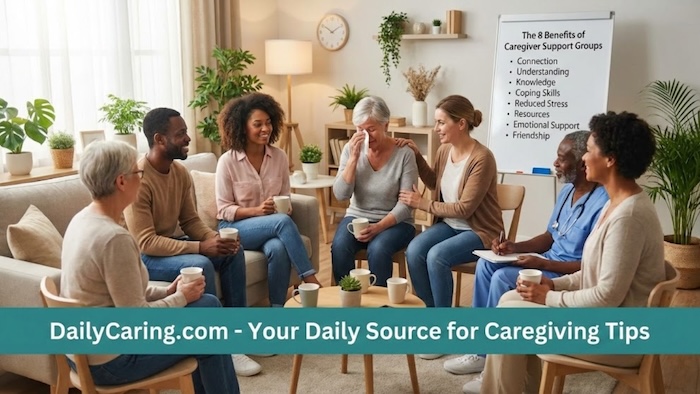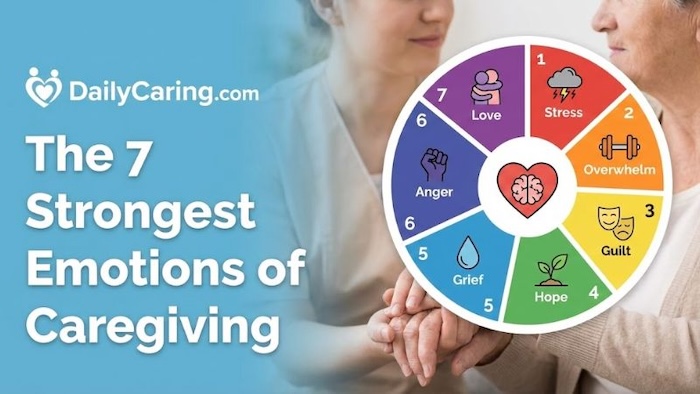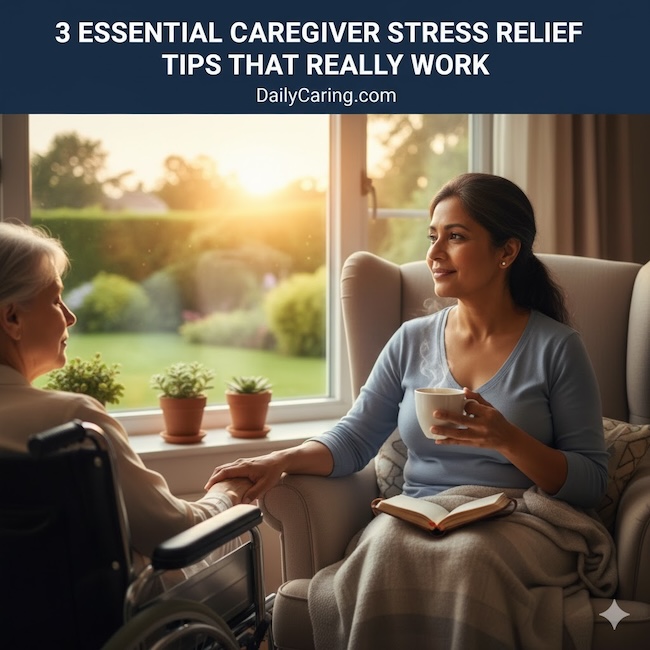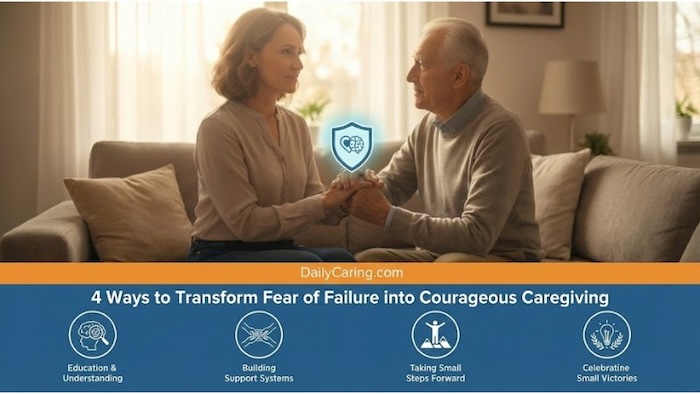You’re pouring everything you have into caring for someone else; managing medications, doctor appointments, and daily needs – but who is caring for you? Caregiving can be one of the most rewarding roles, yet it's also one of the loneliest and most isolating journeys you can undertake. You may feel stretched thin, emotionally drained, and like no one truly understands the unique weight you carry.
This profound sense of isolation is exactly why caregiver support groups exist, and they offer far more than just a place to vent. These groups are a lifeline – a community of people who “get it” without you having to explain. Discover eight powerful, often unexpected benefits that can transform your experience, providing the understanding, tools, and renewed strength you need to care for your loved one without losing yourself in the process.

Caregiving Can Feel Isolating, But You’re Not Alone
Caregiving can be an isolating experience, but you’re not alone in this challenge.
More than 34 million Americans provide unpaid care to an adult aged 50 or older. And nearly 16 million are caring for someone with Alzheimer’s disease or dementia.
But when you’re overwhelmed and exhausted by caregiving responsibilities, it can feel like you’re the only person dealing with so much.
That’s why caregiver support groups are so helpful. They’re filled with people who are in similar situations.
Being able to talk with others who truly understand what you’re going through reduces stress, validates your experience, and gives connection and support.
We explain how participating in support groups can help and share eight benefits of caregiver support groups.
How Caregiver Support Groups Can Help
One of the main benefits of caregiver support groups is that they provide much-needed social support.
This is especially important when family and friends aren’t supportive.
Support group members also validate each other’s experiences. It’s a relief to know that what you’re going through is normal and that you’re not the only one with these feelings – negative or positive.
Support groups are also a great place to ask for advice, find out about valuable resources, or vent frustrations.
You won’t have to worry about judgment or confusion from non-caregivers since everyone is going through similar struggles.
8 Benefits of Caregiver Support Groups
Decades of research and anecdotal evidence indicate clear benefits of participating in caregiver support groups.
Here are 8 top benefits of caregiver support groups:
- Feeling less lonely, isolated, or judged
- Reducing depression, anxiety, or distress
- Gaining a sense of empowerment and control
- Getting advice or information about practical solutions or treatment options
- Improving or learning healthy coping skills
- Getting a better understanding of what to expect in the future
- Improving caregiving skills and giving a better quality of life to your older adult
- Learning about ways to keep your older adult at home longer
Find a Caregiver Support Group in Your Area
- Local hospitals or community centers almost always have handouts with lists of local support groups.
- Enter your zip code in the Eldercare Locator to find the Area Agency on Aging for your area. Call and ask about support groups offered by local organizations.
- For support groups focused on specific health conditions, check websites for local meeting information. Popular sites include:
- Alzheimer’s Association
- National Stroke Association
- Parkinson’s Foundation
- American Cancer Society: We recommend using “support group” as the keyword.
Final Thoughts on Caregiver Support Groups
Joining a caregiver support group is not a sign of weakness; it is a strategic and courageous step toward sustainable care. The eight benefits (from practical problem-solving and validation to emotional release and renewed resilience) offer a holistic support system that friends and family often can't provide.
This community becomes your sanctuary, a place to refill your own cup so you can continue to pour from it. By sharing the load, you lighten it. The empathy, advice, and sheer understanding you find there can be the difference between burning out and finding a new sense of balance and purpose on your caregiving journey.
You don't have to walk this path alone; let a support group be the compass and companion that helps you navigate it with greater confidence and grace.
Recommended for you:
- 14 Caregiver Support Groups on Facebook
- 4 Ways to Reduce Stress from Caregiver Emotions
- 4 Ways to Overcome Caregiver Loneliness in Dementia Care
About the Author

Connie is the founder of DailyCaring.com and was a hands-on caregiver for her grandmother for 20 years. (Grandma made it to 101 years old!) She knows how challenging, overwhelming, and all-consuming caring for an older adult can be. She also understands the importance of support, especially in the form of practical solutions, valuable resources, and self-care tips.














How not to feel guilty? How to stop saying don’t you remember I told you… don’t you remember? Sometimes they seem so lucid that I’m feel I’m going crazy
Guilt is unfortunately common among caregivers. We care, so we feel like there are things that we “should” be doing better. But we really are doing our best and learning as we go.
This article may help you manage those feelings of guilt: 5 Tips for Dealing with Caregiver Guilt in Dementia Care — https://dailycaring.com/5-tips-for-dealing-with-caregiver-guilt-in-dementia-care/
This article may help you avoid saying “don’t you remember”: Q & A: Should You Correct Someone with Alzheimer’s? https://dailycaring.com/q-a-should-you-correct-someone-with-alzheimers/
Thanks for providing such a great content loaded with useful information with us. I would like to add some more on this. Exhaustion of caregivers is a common problem for caregivers of elderly parents or relatives. Taking the time to meet your own needs while caring for a loved one may seem selfish or complacent, but it is necessary for the health and well-being of all concerned. Often being a caregiver means having to make sacrifices to save time and be available to the other person.
Excellent perspective, thank you for sharing!
I feel like a ghost. it didn’t have to be this way. it’s now too much for anyone to understand, so the cruelty of it, is that it’s never ending. I feel like a fool, since all of my efforts pulled everything under like quicksand. There’s no way out…now.
I have to constantly push back thoughts that this is what they wanted. is it? Not that it matters anymore. What’s done is done…as my Mom says.
I’m so sorry that you’re feeling this way 🙁 Caregiving is an incredibly demanding job, physically, emotionally, and financially so it’s natural that it causes a great deal of stress. If you haven’t already, it may help you to find a trained counselor or therapist to help you find healthy ways to cope with the stress and negativity that come with caregiving — https://dailycaring.com/low-cost-therapy-options-help-caregivers-cope/ And in the meantime, you may find these private online caregiver support groups to be helpful — https://dailycaring.com/11-caregiver-support-groups-on-facebook-youll-want-to-join/
I am a 65 White female, and was diagnosed with Dementia, but the doctors I have seen will Not classify it as Alzheimer’s, I’ve been on Aricept for over 15 years, and go for memory testing each year and a slight decline was noticed, and suggested increasing my dosage of 10 mg. once a day to 10 mg. twice a day, however in my own defense, I was under a great deal of stress, not a great time for the testing, needless to say. Lately, my husband who is my Primary Caregiver, (our 3 Sons live up North), says he noticed the decline, not that he’s a Professional. We are both Alcoholics, both in the AA Program for just over 5 years, and our lives have been wonderful, Very Grateful. He seems to think, and suggested that perhaps I need a caregiver a few times a week, to give Him a break, We both decided trying going to sepeate AA meetings which we do, and then do some together and feel that helps, any suggestions would be greatly appreciated, please share what works for you all, and Thank You
It’s great that you and your husband are working together to find solutions that work for both of you 💜 If you later decide to get some caregiving help, this article about lowering the cost may be helpful — https://dailycaring.com/8-ways-to-lower-the-cost-of-in-home-care-for-seniors/
My mom’s been living with us for 5 months now. Everyday, I pray that it will get better, but it doesn’t…She walks with a walker, has fallen a few times, and is losing memory by the minute. I make her 3 meals a day, bathe her, run Dr. visits, get what she needs. Not being well myself, it is all I can do to function in my life. Or should I say that I’ve all but stopped … The guilt of my daily struggle versus the thoughts of “it’s your mom” is overbearing. I feel like an eagle with severed wings, never to be happy again…
I’m so sorry you’re going through this. It’s an adjustment when you start caring for someone. If your mom has a cognitive impairment that is not curable (like dementia), she won’t get better. Unfortunately, conditions like dementia are progressive and there are currently no cures. But if she doesn’t, something else could be causing those issues. There are a variety of treatable health conditions that cause dementia-like symptoms — https://dailycaring.com/7-treatable-health-conditions-with-symptoms-similar-to-dementia/
What can help you cope and allow you time to care for your own health is to get some help with caregiving. You could convince family to help, hire in-home caregivers, or consider an adult day program. You don’t have to do everything by yourself. Caring for an older adult is a tough job and you shouldn’t expect yourself to do everything, even if she’s your mom.
The goal is to make sure she gets the care she needs to be as well and happy as possible. But you shouldn’t sacrifice your own health. Plus, if you become too ill to care for her, she’ll be in an even worse situation. That’s why it’s important to set up a support system and get the help you need before a crisis happens.
We’ve got some articles that might be helpful:
— Why you shouldn’t feel guilty: https://dailycaring.com/dont-fall-for-the-caregiver-guilt-trap-two-common-myths/
— How to take breaks and get help: https://dailycaring.com/6-ways-to-make-it-easier-for-caregivers-to-take-a-break/
— In case you want to ask the doctor about diagnosing dementia: https://dailycaring.com/how-is-dementia-diagnosed-a-geriatrician-explains/
For the falling, I’d suggest speaking with her doctor to ask them to do a full review of all the medication, vitamin, and supplements she takes. Many common medications can cause an increase in fall risk. Simple changes like changing the time a medicine is taken or discontinuing something if it’s no longer needed can make a big difference. Please DO NOT make any changes to her medications without specific instructions from the doctor, that can be dangerous. You may also want to ask if physical therapy could improve her strength and balance and reduce her fall risk. If he writes a prescription, it could be covered under Medicare home health services.
You may also find that a caregiver support group is helpful. They are an amazing source of stress relief, advice, and support. Here’s some info about why they’re so helpful and some of our favorite free, private groups on Facebook:
— https://dailycaring.com/8-benefits-of-caregiver-support-groups/
— https://dailycaring.com/11-caregiver-support-groups-on-facebook-youll-want-to-join/
Big hugs, you can do this. There are ways to care for your mom and regain some health and happiness ❤
My mom has been living with my husband and I since holy 3,2017. It is the toughest thing I have ever done.
She is 92, uses a walker and short term memory is fading. Not sure dimentia or not. But willing to hear signs to watch out for
I have 4 siblings that are non existent
Having her here is so stressful but only option poss is board and care and I would and could never do that
I recently went to a caring for the caregiver appointment and now have a social worker Durhbv that appt I took a quiz of sorts answering without pondering. 16 normal stress and I scored 48!!! She sent me to one on one counseling first appt I was diagnosed with moderate to severe depression. Next appt not for 30 days. What kind of help is that. I felt supported with a couple groups on Facebook but my sister found and read my posts like it was my diary. I felt so violated I since left them as they are not secure. I’m hoping to find support here
It’s wonderful that you’re caring for your mom despite the challenges. Getting more support is a wise strategy and I’m so glad to hear that you’re using the local resources. It sounds like caregiver support groups would be a great way to get additional support. I’m so sorry your sister discovered your posts, the Facebook pages where you posted must have been public so your activity would show on your feed. We have recommendations for free, private Facebook groups where your posts are only seen by the other members of the group. Your sister (or anyone else) would only be able to read your posts if she was also a member of that same private group. More info — https://dailycaring.com/11-caregiver-support-groups-on-facebook-youll-want-to-join/
Your local hospital group may also have in-person caregiver support groups that you may be interested in attending.
If possible, hiring some caregiving help or finding volunteers would allow you to take much-needed regular breaks. In case it helps, here are suggestions on lowering the cost of in-home care — https://dailycaring.com/8-ways-to-lower-the-cost-of-in-home-care-for-seniors/
Your mom’s memory issues could be the result of normal aging or could be caused by a medical issue like medication side effects, a treatable health condition that causes dementia-like symptoms, or dementia itself. Letting her doctor know about your concerns would be the way to start the process to find out what’s causing her memory issues. More info here on treatable conditions and on how dementia is diagnosed:
— https://dailycaring.com/8-treatable-diseases-that-mimic-dementia/
— https://dailycaring.com/7-treatable-health-conditions-with-symptoms-similar-to-dementia/
— https://dailycaring.com/how-is-dementia-diagnosed-a-geriatrician-explains/
Sending big hugs ❤
Is there a CareGiver Support Group in Naples, Fl.? I have been caring for my mom who is now 1 month short of her 105th Birthday. She is for the most part blind and extremely hard of hearing.
Now, a home bound bed patient. Very sharp mind.
That’s amazing that your mom is 105 years old! You’ve got some amazing genes in your family. It’s great that you’re looking or a support group, it’s an effective way to reduce stress, talk with people who understand the situation, and find out about local resources.
In Naples, FL, I’d suggest calling local hospitals to see if they have any caregiver support groups. I’d also suggest calling the Area Agency on Aging for Collier County (phone number here http://aaaswfl.org/) to find out about local support groups. They don’t include that type of information on their website. Local assisted living communities often have support groups and I assume they’d welcome anyone from the community, not just relatives of their residents. I wish we could provide more specific info, but online information is limited. I hope these suggestions help you find a great group!
For family caregivers in the San Mateo CA area, ElderConsult Geriatric Medicine offers a monthly support group- first Wednesday of every month (next one May 6) at 6:30 PM at Hope Lutheran Church 600 42nd Ave San Mateo. Call 650-357-8834 X1 for details/information. Group is free and participants are wonderful. Join us!
Thank you, Irene!
I know its hard for caregivers..helping with ppl with dementia and such.my care is different i take care of my wife.who has fallen twice.breaking a femar in each leg but because of cemo they are not healing so i must do all the arrand most house work.and gro.shopping. I do have a home health care person 2days a week but it always seems i have apointments on these days.so i don’t really get to rest or recupp.12 hours a week is not much time to myself..also she is incontant so Meny pull up changes are needed
This is definitely a challenging situation. Perhaps in the future you’ll be able to have home care for more hours so you can get a little more time for yourself. We’ve also got some tips on how to take very short breaks that are still helpful — https://dailycaring.com/10-ways-caregivers-can-take-a-quick-break-right-now/
You may also be interested in online caregiver support groups that you can access any day, anytime. We share suggestions here — https://dailycaring.com/11-caregiver-support-groups-on-facebook-youll-want-to-join/